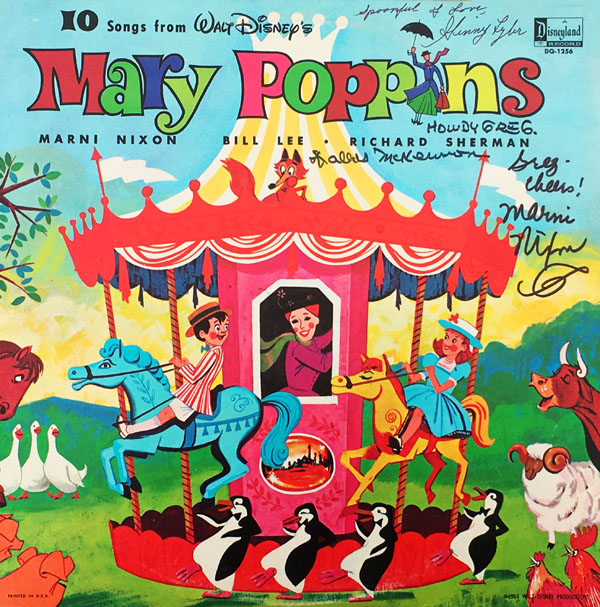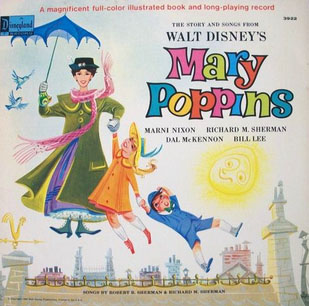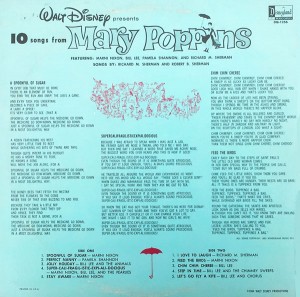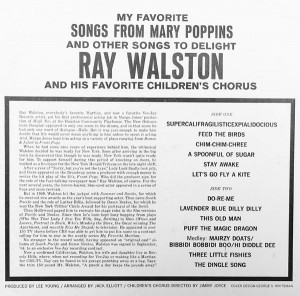Two of Hollywood’s most prolific off-screen vocalists and the star of a beloved fantasy sitcom brought their talents to the Sherman Brothers’ Oscar winning score.

10 Songs from Walt Disney’s
MARY POPPINS
Disneyland Records DQ-1256 (12” 33 1/3 RPM / Mono)
Released in 1964. Executive Producer: Jimmy Johnson. Producer: Camarata. Arrangements: Camarata, Amindav Aloni. Recorded at Sunset Sound, Hollywood. Running Time: 19 minutes
Singing Voices: Marni Nixon (Mary Poppins); Bill Lee (Bert, Mr. Banks); Richard Sherman (Uncle Albert); Pamela Shannon (Jane Banks). “Jolly Holiday” Soundtrack Voices: Dick Van Dyke, Bill Lee, Marni Nixon, Paul Frees, Ginny Tyler, Thurl Ravenscroft).
Songs: “A Spoonful of Sugar,” “The Perfect Nanny,” “Jolly Holiday,” “Supercalifragilisticexpialidocious,” “Stay Awake,” “I Love to Laugh,” “Feed the Birds,” “Chim Chim Cheree,” “Step in Time,” “Let’s Go Fly a Kite” by Richard M. Sherman, Robert B. Sherman.
 During the heyday of Disneyland and Buena Vista Records, the standard procedure for major musical releases was to produce at least two full album versions: a soundtrack with the original stars and a “second cast” album at a lower budget to maximize the audience reach. The Mary Poppins soundtrack songs appeared on the best-selling LP, several compilations and a few 45 RPM singles. Because of their economy—and to preserve the exclusivity of the soundtrack–the second cast songs were more frequently used on products from story records and singles to toys and promotional items.
During the heyday of Disneyland and Buena Vista Records, the standard procedure for major musical releases was to produce at least two full album versions: a soundtrack with the original stars and a “second cast” album at a lower budget to maximize the audience reach. The Mary Poppins soundtrack songs appeared on the best-selling LP, several compilations and a few 45 RPM singles. Because of their economy—and to preserve the exclusivity of the soundtrack–the second cast songs were more frequently used on products from story records and singles to toys and promotional items.
All ten of the songs on this particular album were released on five 45 and 78 RPM singles (among the very last Disney 78’s ever released), a 7” read-along set and 33 1/3 RPM extended play records. In addition, Disneyland Records released an album-sized “Storyteller” LP record and book set with Dal McKennon narrating in the role of Bert. The Storyteller also included Bert’s “One Man Band” music and the finale of “Let’s Go Fly a Kite.”
The presence of two major Hollywood “ghost singers” make this an especially notable recording. Marni Nixon (who unfortunately passed away last year) was the supreme female off-screen singer—singing for Audrey Hepburn in My Fair Lady, Natalie Wood in West Side Story and Deborah Kerr in The King and I. It was Kerr who insisted on revealing the then-unspoken reality that Nixon was an unsung artist deserving of credit, after Nixon was warned by bossy Hollywood people to keep it a secret or “never work in this town again.”
Bill Lee was Nixon’s male equivalent, singing for John Kerr in South Pacific, Tom Drake in Words and Music, Daws Butler in Hey There, It’s Yogi Bear and Christopher Plummer in The Sound of Music (in which Nixon appeared on camera as Sister Sophia).
 Lee was also a member of The Mellomen, a favorite quartet for Disney demo recordings as well as many memorable performances, like the dogs in Lady and the Tramp and the theme singers for the Mickey Mouse Club and Davy Crockett. Lee’s daughter Diana followed in his footsteps, singing for Diana Sowle in 1971’s Willy Wonka and the Chocolate Factory (“Cheer Up, Charlie”) and Liv Ullmann in the ill-fated 1973 Lost Horizon musical remake.
Lee was also a member of The Mellomen, a favorite quartet for Disney demo recordings as well as many memorable performances, like the dogs in Lady and the Tramp and the theme singers for the Mickey Mouse Club and Davy Crockett. Lee’s daughter Diana followed in his footsteps, singing for Diana Sowle in 1971’s Willy Wonka and the Chocolate Factory (“Cheer Up, Charlie”) and Liv Ullmann in the ill-fated 1973 Lost Horizon musical remake.
One of the most curious things about the album is the fact that the second half of “Jolly Holiday” is from the soundtrack of the barnyard sequence in the film. Camarata’s music ends after the first chorus, then Irwin Kostal’s arrangement kicks in. The animation voice cast is there, along with Dick Van Dyke himself—deliberately and artfully concealed by Bill Lee’s voice matching it exactly. On some single releases of the song, only the first half is used.
For “I Love to Laugh,” Tutti Camarata hired an actor who, it turned out, simply couldn’t get the performance to the level he and the Shermans wanted. To show the actor how to do it, Richard Sherman went through the whole song for him—doing it so well that they paid the actor, sent him buh-bye and used Richard’s performance instead!
GIVE A LITTLE LISTEN
“A Spoonful of Sugar”
The delightfully springy harpsichord of Amindav Aloni (a good friend of Marni Nixon) and the polka-paced arrangement of Camarata make this one of the all-time best cover versions of the song. You be the judge, but according to Jimmy Johnson, Nixon “sounded more like Julie than Julie.”
MY FAVORITE SONGS FROM MARY POPPINS
And Other Songs to Delight
Ray Walston and His Favorite Children’s Chorus
Vee-Jay Records VJS-1110 (Stereo) VJLP-1110 (Mono) (12” 33 1/3 RPM)
Released in 1964. Producer: Lee Young. Arranger: Jack Elliott. Choral Director: Jimmy Joyce. Cover Design: George S. Whiteman. Running Time: 33 minutes.
Mary Poppins Songs: “Supercalifragilisticexpialidocious,” “Feed the Birds,” “Chim Chim Cheree,” “A Spoonful of Sugar,” “Stay Awake,” “Let’s Go Fly a Kite” by Richard M. Sherman, Robert B. Sherman.
Other Songs: “Do-Re-Mi” (from The Sound of Music) by Richard Rodgers, Oscar Hammerstein II; Lavender Blue (Dilly Dilly)” (from So Dear to My Heart) by Eliot Daniel, Ray Gilbert; “Puff, the Magic Dragon” by Peter Yarrow, Leonard Lipton; “Bibbidi-Bobbidi-Boo” (from Cinderella) by Mack David, Al Hoffman, Jerry Livingston; Hi-Diddle-Dee-Dee (An Actor’s Life for Me)” (from Pinocchio) by Ned Washington, Leigh Harline; “Mairzy Doats” by ; “Three Little Fishies” by Josephine Carringer, Bernice Idins, Saxie Dowell; “The Dingle Song” by Mack David; “This Old Man” (Traditional, Adapted by Jack Elliot).
 Among the things that make a musical property successful are the recordings that are not the original cast nor the soundtrack, but rather the “studio cast version.” They’re known by several other names, too: “cover version,” “sound alike,” “reinterpretation” and, less kindly, “knock-off.” Disneyland Records called them “second cast versions.”
Among the things that make a musical property successful are the recordings that are not the original cast nor the soundtrack, but rather the “studio cast version.” They’re known by several other names, too: “cover version,” “sound alike,” “reinterpretation” and, less kindly, “knock-off.” Disneyland Records called them “second cast versions.”
Every Disney big-screen musical, starting with Babes in Toyland, was marketed with an “original cast / original soundtrack” and at least one “second cast.” Since the entertainment industry was abuzz with excitement about Mary Poppins long before it was fully filmed, Disneyland-Vista Records founder Jimmy Johnson anticipated a rush on Poppins records by dozens of outside artists.
In his autobiography, Inside the Whimsy Works, he explains his elaborate plans for the score. He put together an elaborate musical sales kit to interest record companies, artists and producers. As several such albums began to trickle into stores, surely Johnson was eager to share this good news with Walt and Roy Disney.
That’s probably why, to this day, there are a handful of Mary Poppins “cover version” albums in Walt Disney’s studio office (which has been recently restored exactly as he left it in 1966). There is a version by Duke Ellington (which was explored in this Spin, Lawrence Welk and actor Ray Walston.
 In the title of Walston’s LP, the phrase, “my favorite” is deliberately used twice to tie it to his 1963-66 TV fantasy sitcom, My Favorite Martian. A cherished baby boomer series, the show focused on a grounded Martian (Walston) who moves in with an Earth reporter (Bill Bixby) and causes wacky hijinks through his zany inventions and special powers—including the ability to disappear by raising his antennae. Walston was already a popular stage and screen performer, famous in the mid-20th century for South Pacific and Damn Yankees and later a familiar face in the 1980’s and ’90s for The Sting, Fast Times at Ridgemont High and Picket Fences.
In the title of Walston’s LP, the phrase, “my favorite” is deliberately used twice to tie it to his 1963-66 TV fantasy sitcom, My Favorite Martian. A cherished baby boomer series, the show focused on a grounded Martian (Walston) who moves in with an Earth reporter (Bill Bixby) and causes wacky hijinks through his zany inventions and special powers—including the ability to disappear by raising his antennae. Walston was already a popular stage and screen performer, famous in the mid-20th century for South Pacific and Damn Yankees and later a familiar face in the 1980’s and ’90s for The Sting, Fast Times at Ridgemont High and Picket Fences.
With the exception of Topper, (1953-1955), which was based on the 1937 feature film, My Favorite Martian was the first fantasy sitcom, preceding such classics as I Dream of Jeannie (1965-70), The Flying Nun (1967-70) and the super-successful Bewitched (1964-72). The wave of fantasy sitcoms on ’60s TV were, in part, a result of Walt Disney’s parade of theatrical comedy-fantasies, beginning with The Shaggy Dog in 1959 (which, ironically, was unsuccessfully pitched as a series pilot to ABC). With that in mind, the presence of Ray “Uncle Martin” Walston on a Mary Poppins cover album brings it all full circle.
The arrangements are by Jack Elliot, a longtime musical presence on TV series and specials, who arranged and conducted the Sherman Brothers scores for Disney’s The Happiest Millionaire (1967) and The One & Only, Genuine, Original Family Band (1968). The children’s chorus is under the baton of Jimmy Joyce, who did augmented the vocals for the Von Trapp kids in The Sound of Music and recorded albums with Doris Day and the Chipmunks (an especially superb LP we looked at here.
Vee-Jay Records was an odd label for this title, as it specialized in rock and roll and rhythm and blues. Early Beatles and Four Seasons records appeared on Vee-Jay and its subsidiary label, Tollie Records. Perhaps they were trying to widen the catalog, though it seems unlikely that there were really very serious plans to further the singing career of Walston, as the liner notes proudly proclaim. But you never know.
GIVE A LITTLE LISTEN
“Chim Chim Cheree” – Ray Walston
This is a promo release of a mono single intended to send Ray Walston rocketing up the charts. Skilled as he was in the craft of acting, he did not possess much range as a singer. That’s probably why he speaks some lyrics as well as singing others.


 GREG EHRBAR is a freelance writer/producer for television, advertising, books, theme parks and stage. Greg has worked on content for such studios as Disney, Warner and Universal, with some of Hollywood’s biggest stars. His numerous books include Mouse Tracks: The Story of Walt Disney Records (with Tim Hollis). Visit
GREG EHRBAR is a freelance writer/producer for television, advertising, books, theme parks and stage. Greg has worked on content for such studios as Disney, Warner and Universal, with some of Hollywood’s biggest stars. His numerous books include Mouse Tracks: The Story of Walt Disney Records (with Tim Hollis). Visit 





















































Add to Ray Walston’s credits: Poopdeck Pappy in Robert Altman’s Popeye, a film which did not succeed in 1980 but has its supporters today, especially among Harry Nilsson fans.
Funny thing: Robin Williams starred in it with him as Popeye, and they both played sitcom aliens.
That’s right! He even had a song in that movie, which by the way was a co-production between Disney and Paramount, yet opened with Popeye animation by Hanna-Barbera.
Vee-Jay also released a handful of 45 rpm singles recorded by Groucho Marx’s daughter Melinda. They weren’t bad either, more-or-less typical early sixties “girl group” type sounding, though they did not hit the charts. At least one of them was released with a picture sleeve featuring a very attractive “headshot” of Melinda. The record company apparently collapsed due to one of its executives embezzling large sums to pay off gambling debts! Oh, well, that’s show biz (?)…
At least most of Vee-Jay’s library is still in one piece.
http://www.veejayrecords.net/
Perhaps my favorite non-Disney performance of the Mellomen (which included Thurl Ravenscroft as well as Bill Lee) was in a “CBS Radio Workshop” episode, “Ballad of the Iron Horse,” with music by Fred Steiner and narration by William Conrad.
“10 Songs from Mary Poppins” was, is, and always will be my favorite Disney recording.